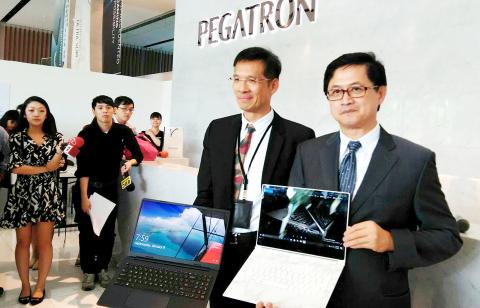Pegatron Corp (和碩), which assembles electronics from Apple Inc’s iPhones to Sony Corp’s game consoles, yesterday showcased its latest electronic car cockpit that integrates infotainment, instrument clusters and information displays as part of its efforts to expand into the automotive electronics sector.
Automotive is one of the company’s core businesses, in addition to notebooks and Internet of Things applications, Pegatron said, adding that it focuses on enhancing its technological capabilities in the three areas.
“It is becoming a trend for vehicles to be equipped with all-digital cockpits. Almost all functions will be done through displays,” Pegatron chief technology officer Steven Huang (黃中于) told a media briefing yesterday. “This is a revolution for the automotive industry.”

Photo: CNA
The electronic cockpit is the latest advance after Pegatron spent several years on the research and development of automotive electronics, he said.
The cockpit integrates a navigation system with heads-up displays, but lacks advanced driver assistance systems (ADAS), which would be supplied by automakers.
Pegatron said it is developing its own ADAS technology as well.
The cockpit is ready, but it needs to pass certification before shipment, the company said, without disclosing when the product would be released.
“We are not in hurry,” Pegatron chairman Tung Tzu-hsien (童子賢) said. “Automotive is a different sector compared with small electronics. It has longer product cycles... Some European automakers launch only one new model in seven or eight years.”
It takes time to obtain certification from automakers, Tung said, adding that the product will also match automaker’s new road maps.
Separately, Huang yesterday commented on Microsoft Corp’s newly announced cooperation with Qualcomm Inc to sell Windows 10 laptops running on Qualcomm’s mobile processor that is based on ARM Holdings PLC’s design.
All laptops on the global market are powered by Intel Corp’s processors.
Qualcomm’s processor delivers better thermal management, but its performance lags Intel’s, Tung said.
“We will spend half a year to observe the adoption” of the new model, Huang said, given Microsoft’s failure to push Windows RT in 2012.

TAKING STOCK: A Taiwanese cookware firm in Vietnam urged customers to assess inventory or place orders early so shipments can reach the US while tariffs are paused Taiwanese businesses in Vietnam are exploring alternatives after the White House imposed a 46 percent import duty on Vietnamese goods, following US President Donald Trump’s announcement of “reciprocal” tariffs on the US’ trading partners. Lo Shih-liang (羅世良), chairman of Brico Industry Co (裕茂工業), a Taiwanese company that manufactures cast iron cookware and stove components in Vietnam, said that more than 40 percent of his business was tied to the US market, describing the constant US policy shifts as an emotional roller coaster. “I work during the day and stay up all night watching the news. I’ve been following US news until 3am

Six years ago, LVMH’s billionaire CEO Bernard Arnault and US President Donald Trump cut the blue ribbon on a factory in rural Texas that would make designer handbags for Louis Vuitton, one of the world’s best-known luxury brands. However, since the high-profile opening, the factory has faced a host of problems limiting production, 11 former Louis Vuitton employees said. The site has consistently ranked among the worst-performing for Louis Vuitton globally, “significantly” underperforming other facilities, said three former Louis Vuitton workers and a senior industry source, who cited internal rankings shared with staff. The plant’s problems — which have not

TARIFF CONCERNS: The chipmaker cited global uncertainty from US tariffs and a weakening economic outlook, but said its Singapore expansion remains on track Vanguard International Semiconductor Corp (世界先進), a foundry service provider specializing in producing power management and display driver chips, yesterday withdrew its full-year revenue projection of moderate growth for this year, as escalating US tariff tensions raised uncertainty and concern about a potential economic recession. The Hsinchu-based chipmaker in February said revenues this year would grow mildly from last year based on improving supply chain inventory levels and market demand. At the time, it also anticipated gradual quarter revenue growth. However, the US’ sweeping tariff policy has upended the industry’s supply chains and weakened economic prospects for the world economy, it said. “Now

COLLABORATION: Given Taiwan’s key position in global supply chains, the US firm is discussing strategies with local partners and clients to deal with global uncertainties Advanced Micro Devices Inc (AMD) yesterday said it is meeting with local ecosystem partners, including Taiwan Semiconductor Manufacturing Co (TSMC, 台積電), to discuss strategies, including long-term manufacturing, to navigate uncertainties such as US tariffs, as Taiwan occupies an important position in global supply chains. AMD chief executive officer Lisa Su (蘇姿丰) told reporters that Taiwan is an important part of the chip designer’s ecosystem and she is discussing with partners and customers in Taiwan to forge strong collaborations on different areas during this critical period. AMD has just become the first artificial-intelligence (AI) server chip customer of TSMC to utilize its advanced